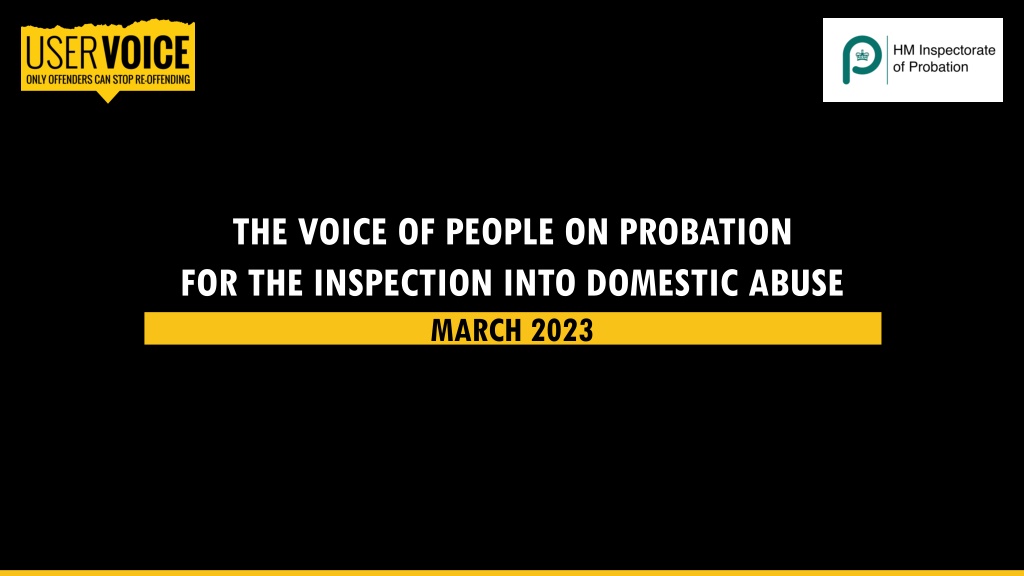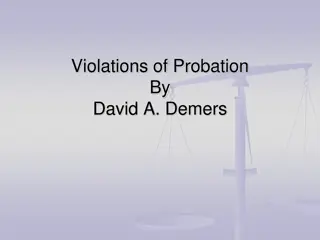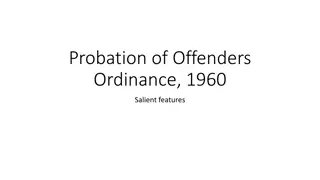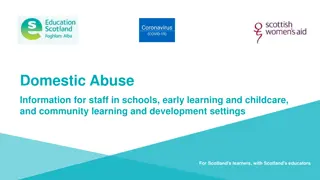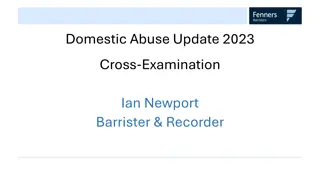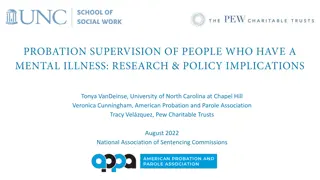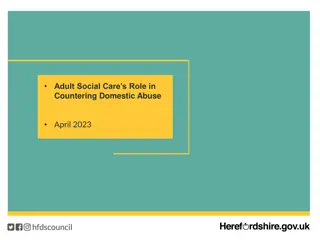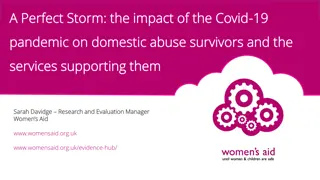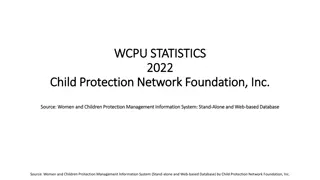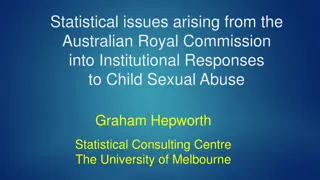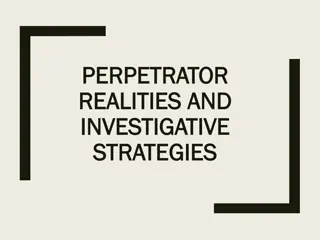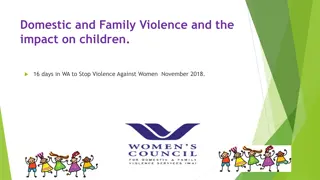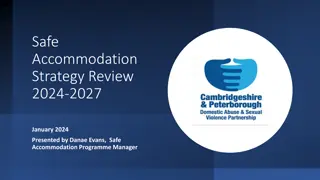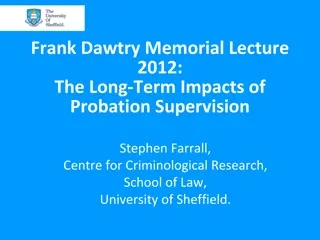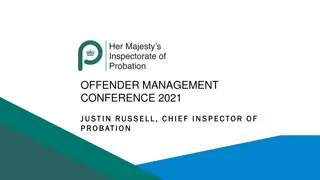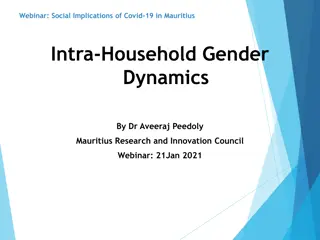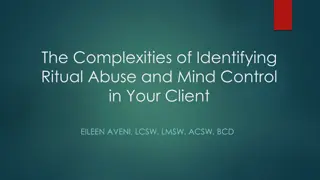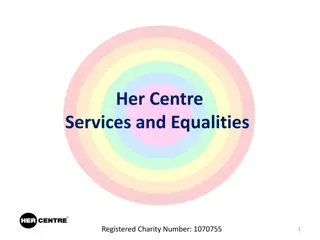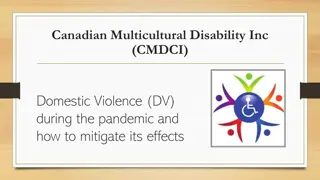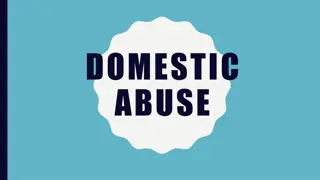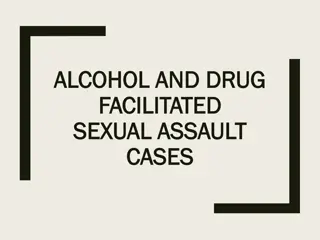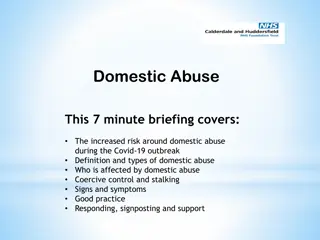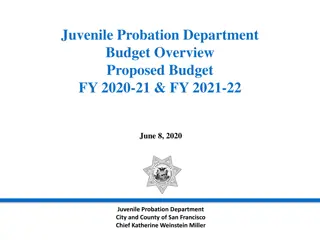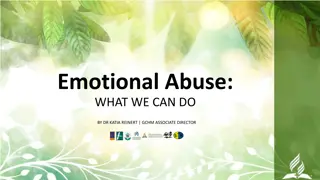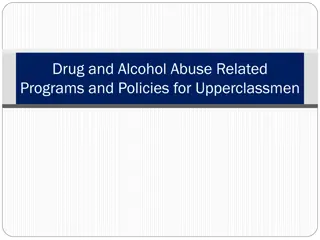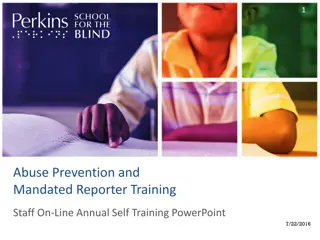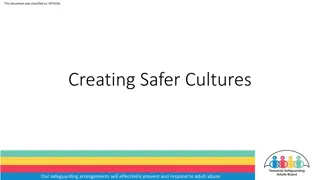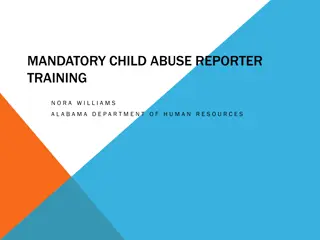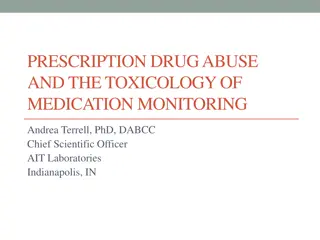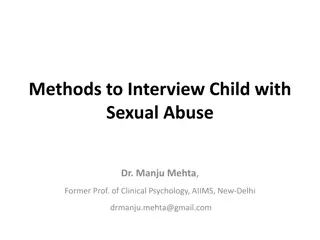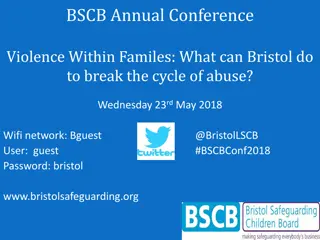Understanding Probation Services in Supporting Perpetrators of Domestic Abuse
The research project aims to better understand how Probation Services support perpetrators of domestic abuse and whether the services meet their needs. Key findings show that intervention programs have positive impacts on participants in avoiding further incidents of domestic abuse. Participants emphasized the importance of flexibility, the quality of the relationship with probation practitioners, and the need for more participant-led solutions.
Download Presentation

Please find below an Image/Link to download the presentation.
The content on the website is provided AS IS for your information and personal use only. It may not be sold, licensed, or shared on other websites without obtaining consent from the author. Download presentation by click this link. If you encounter any issues during the download, it is possible that the publisher has removed the file from their server.
E N D
Presentation Transcript
THE VOICE OF PEOPLE ON PROBATION FOR THE INSPECTION INTO DOMESTIC ABUSE MARCH 2023
Its making me go over what was going on in my life at the time. It s building me back to how I was before. Big eye opener.
WHO WE ARE OBJECTIVES The overall objective was to better understand how Probation Services are supporting perpetrators of domestic abuse and how or if the service meets their needs. Furthermore, our objective was: This is a research project commissioned by HM Inspectorate of Probation andconducted by User Voice. To understand the experience of people on probation and what support they have (or haven t) had both in general and in relation to their offence. To understand the effectiveness of intervention programmes in reducing reoffending and helping rehabilitate participants. To collate people on probation's views on what probation needs to do to better help perpetrators of domestic abuse. User Voice is a charity run by ex-offenders. User Voices participation ensures the research is truly Peer Led at every stage. To highlight any good practices that could be built upon by the service.
KEY FINDINGS Intervention programmes provide positive experiences for participants that aides desistance from further incidents of domestic abuse. 67% of those attending intervention programmes stated that their experience has had a positive impact on them avoiding further domestic abuse incidences. The majority of the others rely on self- motivation. Probation experience varies from person to person. All aspects of an individual s probation experience are greatly affected by the relationship with their probation practitioner. People on probation need flexibility. There needs to be an agreement between the individual and their probation practitioner on an order that suits their offence but also their individual needs. Just over half of people on probation feel heard by probation as their stories are listened to by probation staff. However, the majority feel like they don t have a say in how probation is run. Participant led solutions include better training for probation staff, flexibility and the involvement of lived experience.
55 PEOPLE HAD THEIR SAY: ALL PARTICIPANTS TOOK PART VIA REMOTE SEMI-STRUCTURED INTERVIEWS GENDER AGE Female 4% 42% 31% 19% 4% 4% Male 96% <25 25-34 35-44 45-55 >55
55 PEOPLE HAD THEIR SAY: ALL PARTICIPANTS TOOK PART VIA REMOTE SEMI-STRUCTURED INTERVIEWS NEURODIVERSITY ETHNICITY Asperger s (1) White British 83% Learning and Reading difficulties (3) Unspecified (2) 9 PEOPLE Mixed Heritage 8% Black Caribbean 4% DISABILITY 4% White European General issues with mental health (1) No 8% Dyslexia (1) 2% British Asian ADHD (1) Yes 92%
INTERVENTION PROGRAMME EXPERIENCE
CARING DADS 2% SKILLS FOR RELATION SHIPS 6% BUILDING BETTER RELATIONSHIPS 83% BREAKDOWN OF THE TYPE OF INTERVENTION PROGRAMMES ATTENDED BY PARTICIPANTS NOT STARTED YET 4% LANCASHIRE WOMEN 2% STEP- WISE 2%
OVERALL, PEOPLE HAVE HAD A POSITIVE EXPERIENCE WITH THEIR INTERVENTION PROGRAMMES Q: Please state on a scale of one (not at all) to five (very) how impactful the intervention programme has been in helping you to avoid further domestic abuse incidences: 2/3 of participants believed that their intervention programme has had a positive impact on them avoiding further domestic abuse incidences. 57% of participants on the Building Better Relationships (BBR) reported the same. 40% 37% The reasons for their positive experiences were: A change in mindset and an improved ability to self reflect. Improved coping mechanisms and ability to control emotions. Helpful and engaging staff. A positive group environment. 29% 27% 17% 15% Overall, 16% participants responded that the programmes haven t been impactful in helping them avoid further domestic abuse incidences (19% for BBR). Their reasons for stating this were: Self motivation to change behaviour. Not catering the course to individuals. Information overload. Issues with travel. 12% 10% 7% 6% 1 2 3 4 5 (not at all) (neutral) (very) All Intervention Programmes Building Better Relationships (BBR)
Before going on the course my mind set was one way and after the course it was another. It made me take a step back and realise I was in the wrong. So, taking that forward it will help me. INTERVENTION PROGRAMMES ARE AN EYE-OPENER AND A CATALYST FOR CHANGE This was the third time on the same offence, but the first time I got anything out of it. I did find it helpful, it did prevent things from happening again. I loved going over things I had done and realise where I went wrong. The positive is that it has changed me. Probation haven't changed me, the course has pretty much changed my life. It s changed me in loads of different ways. Participants reported that their intervention programme experience has been a catalyst for a positive change in their mindset. It offered many an opportunity to self-reflect. I m enjoying it. It s an eye opener I used to walk around with a chip on my shoulder, it really changed me as a person. The programmes provided insight into why participants were behaving the way they were and allowed them to own their mistakes. It had a tremendous impact on myself. It opened my eyes to a few things you would have never even thought was abuse. You know it s quite an eye opener. It gave participants a better understanding of what constitutes as abuse. I struggled with the course at first a lot... But, I stuck it out, got it done and now situations in my life have completely changed me as a person. The course helped me with that, It helped me in my head, mentally. It was a little bit like therapy.
I havent done the same offence since; Ive been able to avoid and control certain situations. PEOPLE DEVELOPED COPING MECHANISMS THROUGH THEIR INTERVENTION PROGRAMMES The coping mechanisms were spot on. Had I learnt this sooner I wouldn t have been in this position. Since being released and being in BBR I ve had a new partner, we ve got into a couple of disagreements and I ve used the skills I ve learned In BBR - took some time, stepped back, see where she was coming from and be able to say, however this is how I feel and stuff like that. So, it s made a really positive impact on me in that sense, instead of relying on instincts. People reported that their intervention programmes have directly helped them to avoid reoffending. They reported practicing coping mechanisms that they learned on the programme. It has taught me quite a lot to be honest. Just to control how I go about speaking with people. It has helped me out with people. Made me step back a bit and think about what I m actually going to be saying. The main takeaway from many was an increased ability to control their emotions, not to be reactionary and make better decisions. It allowed people to have a better understand of the perspective of the victim. Just having an insight into different scenarios and how to control yourself. I got insights into how children experience things and women and learn a different perspective. Participants also stated that they learned people skills for their everyday life. For example, how to speak to colleagues and friends in a more productive manner. I m a lot more aware of my decision making and know how to handle myself.
The way my tutor explained things was brilliant. He also let me speak and have an opinion which is important. He was brilliant. INSIGHTFUL AND CARING TUTORS FOSTER UNDERSTANDING AND IMPROVE DESISTANCE I have learnt a lot from it. It s mainly the officer, she helped me a lot. If I didn t have her, I would not have gotten through it. I wouldn t understand things a lot just with the courses and that, [Tutor] she works with you, and you understand her. It s been better and like, she always sets you goals and stuff. So, it helps you just keep your head down, and you know, keep working. Many reported that the person leading the programme was helpful and understanding which led to a better experience and increased learning. Some things are obvious, but you don t think about it and when they talk about it makes you realise. The way they explain it makes it so easy to understand. Effective and relatable staff resulted in an increased capacity to take information and coping mechanisms onboard. It definitely 100% helped me to think about things. The tutors were quite good to be fair I could relate to one of the tutors and I think more so to some of the pupils as well, it was alright. Everyone was there through different situations, but I think the people that went all the way worked to the end really.. This also helps to create an environment that the participants want to come back to. People reported that the structure of the BBR course aided their ability to learn. It s really well presented, very well laid out. They explain everything to you very well. I m very impressed so far.
There's a couple of things I will take out of it which I can probably use in the future. The fellas I was with, we was obviously there to help each other. It's good to help each other. A POSITIVE GROUP ENVIRONMENT LEADS TO IMPROVED EXPERIENCE There s also something about being in a group, where you got people going through similar things in regards to struggling with child contact, all that kind of stuff that goes on. Whilst it has good and bad sides, you don t want to get caught up in that victim mentality but at the same time it helps knowing I m not the only one going through those things. The majority of people found the group setting to be beneficial, although some did state otherwise. We had a good team and a good group and we bounced off each other and it wasn t a dreadful feeling to go to. It was a cohesive group and we shared our experiences. The activities were good. Participants benefitted personally from helping each other understand their situations. People found it useful to be around others that have similar shared experiences with themselves. The people in the group made it good for me. A positive group environment increased the likelihood for people to complete the programme. I actually made some really good mates and I learned a lot. The lads I m doing the course with, we re all on the same boat, we re bonding. So the comradery is a good thing I d say.
I dont feel like I need to go on probation or any advice on what to do next because I ve already sorted everything out before I had to go to court. SELF-MOTIVATION IS AS IMPORTANT AS THE PROGRAMME TO AVOID REOFFENDING Myself is my motivation. It wasn t helpful as the courses are always the same that I did throughout my sentence. It wasn t beneficial as it was repetitive. It was like a refresher. I didn t learn anything new. I didn t need the course in order not too reoffend - I already knew it was the worst thing I had done in my life. It has been educational. It s not a total waste of time. Most people that didn t think the intervention programme was impactful were already self- motivated to not be involved with further incidences of domestic abuse. I think they overload you with too much stuff. I think they cramp too much in with that length of time, by the time it gets to the end you ve forgotten the beginning of it. I think they just cramp too much in the sessions, if they put less in, I think you d get more out of it. However, some people felt that the programme was not impactful. The reasons given for this were: The lack of an individually tailored programme to meet their needs. There was too much in the course itself. Information overload meant that the message was sometimes lost. Only trouble I had was just getting there, I had to get the bus because I ain tgot a license. But apart from that I enjoyed it. Some people felt like the long distances travelled were a barrier for them getting what they needed out of the course. I think it dragged out. They just gave everyone the same thing like: go on BBR . We all have different needs. Personally, myself, I didn t have any needs. They just pile everyone in. I can t put my finger on anything that I got out of it!
Q: Please state on a scale of one (not at all) to five (very) how well you feel supported by probation in helping you to avoid further domestic abuse incidences: 25% 25% 24% HOW IMPACTFUL PROBATION EXPERIENCE IS VARIED FROM PERSON TO PERSON 20% 6% 1 2 3 4 5 (not at all) (neutral) (very)
RELATIONSHIP WITH STAFF PROBATION EXPERIENCE MAP: ALL AREAS ARE AFFECTED GREATLY BY THE EFFECTIVENESS OF THE INDIVIDUAL S RELATIONSHIP WITH THEIR PROBATION PRACTITIONER BEING HEARD INDUCTION ACCESS TO SERVICES APPOINTMENTS
OUTSIDE OF THEIR INTERVENTION PROGRAMME, THE RELATIONSHIP WITH THEIR PROBATION PRACTITIONER IS THE KEY COMPONENT AFFECTING PEOPLE AVOIDING FURTHER INCIDENCES OF DOMESTIC ABUSE Q: Do you think you have an effective and trusting relationship with probation staff? Q: Please state on a scale of one (not at all) to five (very) how well you feel supported by probation in helping you to avoid further domestic abuse incidences: 58% Mixed response, 13% 36% 35% 29% No 25% 17% 17% Yes 62% 8% 6% 3% 0% 1 2 3 4 5 (not at all) (neutral) (very) Those that have an effective and trusting relationship with probation staff Those that do not have an effective and trusting relationship with probation staff
Always helped me in engaging with life and Ive learnt a lot of skills to help me in life. The relationship I have with the officers are good and it has allowed me to open up. DEVELOPING TRUST IS KEY TO AN INDIVIDUAL S PROGRESS She s respectful. I respect her because she respects me. He recognised the change in me and didn t judge me. He was understanding of my current situation. When people on probation have an effective and trusting relationship with their probation practitioner, they are more likely to have open conversations about their life and offence. Two officers who have gone above and beyond to help at all costs. They check in to see how I am. If I can t make it or if she can t we just communicate, so there s always communication. People develop a trusting relationship through good modes of communication that pass no judgement. Respectfulness from probation practitioners facilitates respect both ways which leads to a better experience. They have offered me support and always weekly check in with me... She s always said that if I need to ring her anytime, I m always welcome." A good probation practitioner often goes above and beyond for the individual. When this happens, people feel well supported. I just feel like I can say anything to her. I can tell her and she don t judge, you know. It s like having a therapist you can open up about anything without feeling judged and they ll support you.
Ive had three probation officers in a space of a year. Every time I get comfortable with a probation officer, they up and go to another office. TRUST CAN T DEVELOP WHEN PEOPLE EXPERIENCE A REVOLVING DOOR OF PRACTITIONERS I ve had five different PO and I ve been on it only a year or so you don t really get a chance to build a relationship with them. I don t really hear from them often. When you go to appointments, they just ask you how you ve been, it s just a catch up... There s not really anything on how to stop anything. When people experience a frequent change in probation practitioner, the connection they developed with the previous member of staff goes away and it takes time to develop trust again. He says I m very manipulative, I control women, I groom women he says to me, it put me off telling them the truth. People experienced a lack of communication from probation staff, even some that indicated they needed more support. It s like the person you re dealing with is pretending to care about what s going on in your life. The way probation practitioners interact with people can often lead to them putting up barriers which affects their progress. My probation officer can be quite condescending sometimes, speaking and looking down to me and that. Some talk to you like a piece of shit, as it s just a job for them.
Q: Please state on a scale of one (not at all) to five (very) how informative and useful your induction was: 56% OVER HALF FOUND THEIR INDUCTION TO BE VERY USEFUL AND INFORMATIVE 13% 13% 10% 8% 1 2 3 4 5 (not at all) (neutral) (very)
MOST EXPERIENCED AN INFORMATIVE AND STRAIGHT- FORWARD INDUCTION They explained to me really well that I have to attend, that they are here to support me and that the courses are there to help me. They also explained that if I don t attend, I could go back to court. I had an interpreter to help explain it all. They also respected that I worked full time, so they worked around that. 69% of participants said that their induction was informative and useful. Such people reported that their orders were explained to them in detail. They did and they said if you need any help here s my number, that they re always available. Some also reported that their practitioner made the experience easier and that they were flexible around their needs. 1 in 5 said that their induction experience was not informative nor useful. They don t explain anything to you, and then when it comes to doing stuff, they breach you straight away. Some people on probation reported not having a proper induction and others simply stated that they came out of the appointment with little understanding. Most of the time they don t give you any information. Nothing has ever been explained to me properly.
HALF OF PERPETRATORS OF DOMESTIC ABUSE GET WHAT THEY NEED OUT OF APPOINTMENTS MAINLY DUE TO THE RELATIONSHIP WITH THEIR PRACTITIONER Q: Do you get what you need out of appointments? Q: Do you get what you need out of appointments? 100% Mixed response, 9% 74% Yes 49% No 42% 15% 11% 0% 0% No Mixed reponse Yes Those that have an effective and trusting relationship with probation staff Those that do not have an effective and trusting relationship with probation staff
If I werent able to make an appointment my PO said I could always ring her and sort it. PEOPLE APPRECIATE FLEXIBILITY WITH APPOINTMENTS She goes out of her way because I live far away from the office. Biggest challenge with community work was getting to and from the unpaid work, and there was a postal strike... The minute I told my probation officer about this she said No, we can t have that, it's not good for you, it s not good for us and she put me off the list basically. of people that have an effective and trusting relationship with their probation practitioner get what they need to out of appointments. I did get what I needed in the sense it has helped me look at my behaviour and realise that I don t want to keep on being on probation. I would much rather start my own business. This is mainly due to probation staff being accommodating and flexible. Yeah, I mean they know that my medication make me sleep quite heavy, they always give me afternoon appointments. Well every time I go there, we chat about stuff and they give me advice. Many feel that don t need much support from probation and are happy with quick and easy appointments. However, such arrangements must be made in collaboration with their practitioner and take the terms of their order into account. I don t need anything out of my appointments. I just need to turn up, put my mark on the register and leave because there is nothing that I want or need them to do for me. They put you at ease during appointments.
I didnt get anything, I learned nothing from them. I learned more from prison. I d rather sit in a jail than deal with them lot. I went and did everything on my own. POINTLESS APPOINTMENTS LEAD TO FRUSTRATION My PO tried to make me do something while I was at work. The appointments were just a tick-box exercise, it was three buses to get there and it s not worth my time at all. I don t have much of a social life due to my order They haven t got it right. I have appointments every month, but I don t see the progression. 100%of people that don t have an effective and trusting relationship with their probation practitioner don t get what they need to out of appointments. Not at all. I come out of there thinking what was the point of that? . For instance, two weeks ago I was there, it was the same questions, literally I was there for ten minutes. She asks what I ve been up to, how are things between me and my partner, how I ve been coping; she just repeats the same questions over and over. It s like she s reading out of a book. In a sense the appointments feel rushed. Many described the appointments as pointless tick- box exercises with people not taking any real value from them. people on probation lead busy lives and work, therefore need flexibility around appointments, which many of them aren t getting. people on probation have to travel long distances to appointments which when they arrive, often seem pointless. It takes me two trains to get there and if I m working it makes it difficult. If I m working, I won t get back on time and it s almost like a set up for fail. A threat of breach leads to people not getting what they need from appointments. I got to travel eight miles to go and say hello and then go. No, they seem pointless to me.
LESS THAN HALF OF THOSE THAT NEED ADDITIONAL SUPPORT FROM PROBATION ARE RECEIVING IT Q: Have probation helped you access the services you need? Q: Have probation helped you access the services you need? 64% 64% 31% 31% 27% 27% 10% 18% 18% 9% No Mixed reponse Yes Yes Mixed Reponse No No support needed Those that have an effective and trusting relationship with probation staff Those that do not have an effective and trusting relationship with probation staff
The new probation officer Ive got; shes been a really good help for me. A CAPABLE PROBATION PRACTITIONER LEADS TO BETTER ACCESS TO SERVICES They have helped me access a service called Inspire that helped me with alcohol. I knew I had to stop anyway and I have stopped taking drugs now and started going to AA to help with drinking. CATCH22 - They provide support around mental health, kind of a counselling service. PO put me in touch with them. I had a lot of issues with it initially because the worker with CATCH22 left but I still had support from my PO. 2/3of people that have a positive relationship with their probation practitioner have access to the services they need outside of their intervention programme. She ll give you then advice on stuff, or if something s not going that well she ll sort of want to know why and again give you sort of advice. I did have trouble with housing and then she put me on to them. People reported accessing a number of services through their practitioner such as: Mental health provision. Housing. In fairness, yes. When I came to the property in Watford , which was a nice property and a single residency property, probation did help me with bus passes and at that time probation put me in contact with Forward Trust who would start looking for property for me. Substance and alcohol misuse programmes. They have offered. There was a period in time where I was a bit down and they proposed a mental health thing.
I dont associate the word support' with probation whatsoever. 43% OF THOSE THAT NEED SERVICES DON T HAVE ACCESS TO THEM They did recommend a course (managing emotions and feelings) but it was an hour and a half travel each way, so it didn t happen. Maybe there were other services I could have benefitted from but I never got to do them. I mentioned to her about the hub I saw online but she didn t know anything about it so I never did it. No. Asking for grants and stuff, and they ve given me nothing at all. They don t listen if you make a complaint. Regarding drug abuse, they told me as soon as I d come out of jail they d test me every week, they haven t tested me since I ve been out. I go in and ask to be tested, only to be told they don t have the equipment. 2/3of people that have a negative relationship with their probation practitioner do not have access to the services they need. Vital services such as substance misuse support, help with employment and housing support are imperative for a lot of individual s desistance and many are not receiving it. I have asked but I have just been told to call this person and that person, it s never directly through them. I have had to contact and access other services myself, if I hadn t done that I would be nowhere. Probation didn t do anything. They ve done nothing to try and help me out. Probation haven t helped me get a new job, they only helped me lose my job.
JUST OVER HALF OF PERPETRATORS OF DOMESTIC ABUSE FEEL LIKE THEIR VOICE IS HEARD WHILST ON PROBATION Q: Do you feel like your voice is heard by probation? Q: Do you feel like your voice is heard by probation? 80% Mixed response, 18% 54% Yes 53% 38% No 29% 10% 10% 8% No Mixed reponse Yes Those that have an effective and trusting relationship with probation staff Those that do not have an effective and trusting relationship with probation staff
My voice is heard, certainly listened to I think, but whether its heard is a different matter. 80% OF THOSE WITH AN EFFECTIVE RELATIONSHIP WITH STAFF FEEL HEARD They do listen do you and another good thing as well, if you can't do your probation on a Saturday, they can always put it to a Sunday. So, they do understand quite well I think and they do listen to you. Probation have listened to me. I don t know where it goes after the phone calls but I can talk and it is easy to get things off my chest. I don t feel judged if people don t know. People often feel heard when they can have open conversations with their probation practitioner. They are able to give their side of the story. Yes, they respected what I was saying and were listening to me. Although 53%of people feel heard by probation. Significantly fewer people feel like they have a say in how probation is run. Yeah, yeah, yeah but I think we should have more of a say in how things are run. It is part of the government after all who are working for the people, us. Many people stated that they would like to have a say in how the service is run and feel that their lived experience could have real benefits for the service. I feel that I got a chance to tell my story and I did feel that she respected me for it. But to me I didn t need respect, it s about how the court sees it or the police. I think people like me should have more of a say, the service is meant to help people reform so no-one knows how to do it better than the people on probation. It could be a better service if they start listening to people like me. I do feel I can make a complaint if necessary but don t want to rock the boat.
I wouldnt say so. Youre a lucky person if you get an officer that wants to follow you up and go that extra mile for you. I have told my story, but it makes me think whether they re interested or writing it down for their bosses, I don t think my story have been heard or appreciated at all. THOSE THAT DON T FEEL HEARD WANT TO HAVE THEIR SAY Not really, because I m not heard enough. I mean, I literally just go in there and go; just make everyone happy and go. They haven t asked me about is. I was supposed to but it never happened. I want to talk to them about the BBR programme. I s been a few months so they should have reached out. It is a bit annoying. 3 in 10don t feel heard by probation. Only 8% of people interviewed that do not have an effective relationship with probation staff feel heard. Those that don t feel heard want to have their say. They believe that their lived experience can make a positive contribution to other people s probation experience. Yeah yeah, I d say that we should have more of a say because of what to do in the courses is about us and improving us as people so why not ask us? People want to interact with those that understand them. They want more interaction with people with lived experience. People that have been through what we ve been through should have a say in probation. They aren't prepared to deal with people like myself. These probation officers don t know the score, they haven t been there.
IMPROVEMENTS AND SOLUTIONS
PARTICIPANT LED SOLUTIONS 1 2 THE ISSUE: The variance in experience that people are experiencing with probation practitioners is vast and people s rehabilitation suffers because of it. THE ISSUE: People on probation are experiencing a revolving door of probation practitioners. This lack on continuity inhibits trust and creates frustration for the individual. SUGGESTED SOLUTION: In depth training that involves both people with lived experience and those staff that are noted by people on probation as getting it right. SUGGESTED SOLUTION: The probation officer does not know how to help with the opened-up feelings and thoughts, and you are left for a week or so until your next appointment trying to deal with those thoughts that are not beneficial to your overall wellbeing. probation officers need to be able to help put those emotions back in working order probation should be trained up more efficiently in mental health. If they are going to discuss it, they should be able to support it. Better support probation practitioners to prevent frequent changes to individual cases and make caseloads more manageable for staff. Had four different probation officers in six months, which leaves you very distressed and anxious and it s not easy. There has to be a way to have the same probation officer consistently.
PARTICIPANT LED SOLUTIONS 3 4 THE ISSUE: People lead busy lives and need flexibility in their orders. Flexibility was a driving factor in building a positive relationship with probation staff. THE ISSUE: People on probation often feel like they can t relate to probation staff as they don t understand their background or their experience. SUGGESTED SOLUTION: People s schedules and personal lives should be considered and discussed during their induction to find the best structure to their order that works for both the probation practitioner and the individual. SUGGESTED SOLUTION: Incorporate more people with lived experience in both the intervention programmes and on probation staff. "There needs to be people who are more educated and have lived experiences. That way they can offer you proper help based on your experience." They re not flexible with appointments. If I don t turn up, I get breached so I have no choice. We need more flexibility around our lives.
PARTICIPANT LED SOLUTIONS 5 6 THE ISSUE: A minority of people had an issue with certain modules in the BBR programme. THE ISSUE: People on probation often travel long distances to appointments which they feel are pointless. SUGGESTED SOLUTION: Review the methodology and modules via consultation with people that have completed the course to see what could be improved. SUGGESTED SOLUTION: Consider more remote appointments for those that travel long distances and reimburse travel for those that need to spend a lot on public transport to get to the office. In BBR I think they should be a bit clearer about their methodology. They d randomly put on a DVD that has nothing to do with the session, they need to explain why they put it up. If they want me to go there, they should pay for me to go there. I think some of the PO check ins could ve been done over the phone or virtually Why do we have to trek all the way across a county just to go and see someone for 10 minutes? Only thing I would build on the BBR. The first module was really judgy, it assumes that you have a certain mindset and believe certain things. The later it passed on the course it got more relevant.
PARTICIPANT LED SOLUTIONS 7 8 THE ISSUE: Once the intervention programme is complete, some feel that they need further reminders and conversations to stay on the correct path. BUILDING ON WHAT IS ALREADY THERE: SUGGESTED SOLUTION: Many stated that the intervention programme needed improvement and was the biggest contributor to them not being involved in further incidences of domestic abuse. Bring the language and the learning from the courses into the probation experience and appointments. Therefore, continuing the support. The positive is that it has changed me. Probation haven't changed me the course has pretty much changed my life. It s changed me in loads of different ways. The only problem I would say is that some people could benefit from after- help afterwards you know There were a few of the boys who were on the course with me who actually took my number. They were just talking to this thing and then left out in the wild sort of thing. They kept contact with me and they were asking me for help and stuff. I just advised then as best as I could. Just to carry on what they re doing because they re doing an amazing job.
THE VOICE OF PEOPLE ON PROBATION FOR THE INSPECTION INTO DOMESTIC ABUSE MARCH 2023
